
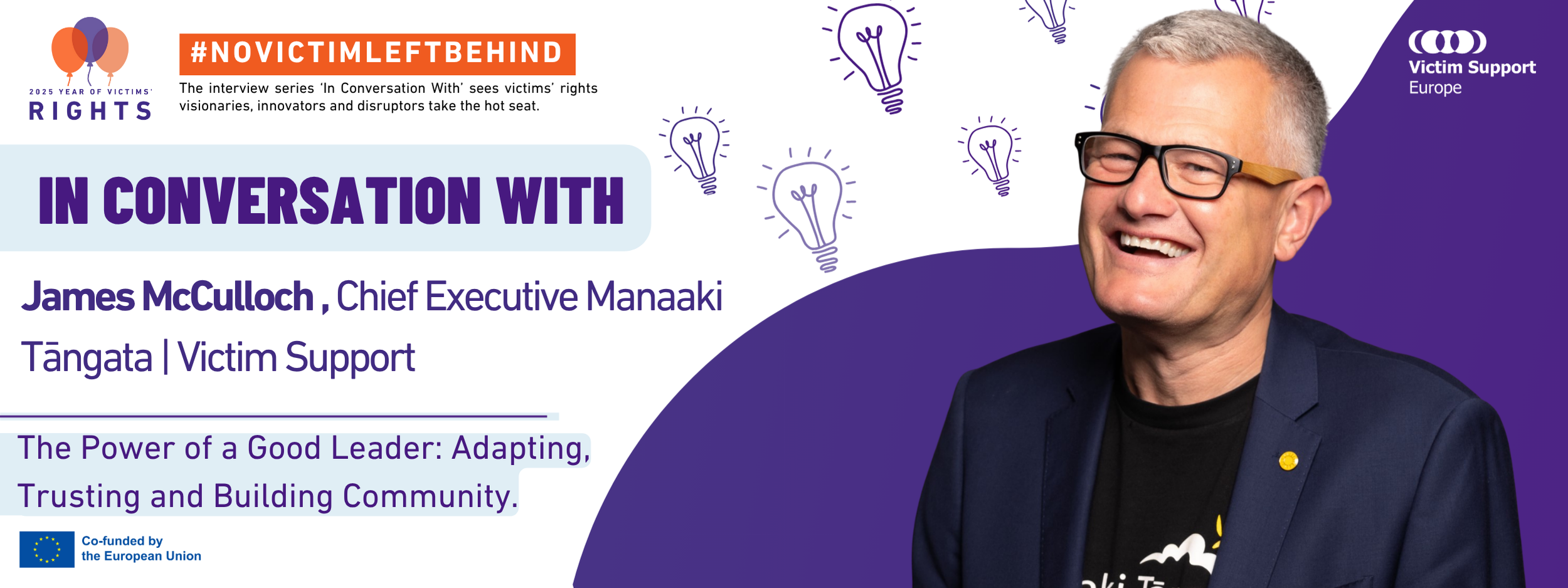
The Power of a Good Leader in Victim Support: Adapting, Trusting and Building Community.
Manaaki Tāngata | Victim Support was facing some huge challenges in 2022; some that threatened it’s long term viability as an organisation. Enter: James McCulloch. Through his impressive leadership, attention to detail and trust in his employees,Victim Support New Zealand is now highly regarding by its clients, staff and stakeholders for the exceptional quality and impact of its support but also for the wellbeing first approach it proudly promotes for all staff. McCulloch walks us through his process in the victim support landscape and how he leads this organisation with trust, responsability and passion.
Greta Hirschberg, VSE: You have been in the non-profit sector for a long time now. How has it changed in that time?
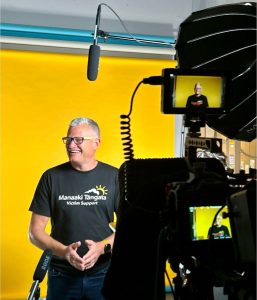
James McCulloch
James McCulloch, VSNZ: Although I had a few years in the public and private sectors too, I really love working in non-profits, or for purpose organisations- I prefer that term! What doesn’t change over time is why people are attracted to these organisations: the purpose, the desire to make a difference and to do something meaningful.
But how we work has changed hugely, and continues to as we embrace the possibilities of AI and other ways to more efficiently support beneficiaries. What also never seems to change is the constant concern about resources- time and money- there is simply never enough to do what is really needed.
So, care for people within this sector feels even more important than ever- and that’s something I focus on as leader.
Greta Hirschberg, VSE: And how has Victim Support New Zealand changed throughout the years?
James McCulloch, VSNZ: Hugely! When we were founded 38 years ago, it was initially a very localised and small scale volunteer based set up. This expanded and grew throughout New Zealand, and eventually through Government and other funding, we started to establish staff in victim support worker roles across the country and gradually ‘professionalised’ the service.
In recent years, that has meant embracing technology to help us cope with the ever-growing demands for our services, and to provide support in a range of ways that best suit our diverse population. Raising awareness of our work has become even more important too so that people are aware we exist, but also to strongly make the case with stakeholders and funders for support.
Earlier this year, we launched a series of big changes: we completed our transition to a fully staff based organisation, we launched an exciting new case management system to better support victims and free up time for our front line, and we fully embedded our simpler and more focused Core Purpose- ensuring we put our efforts into where we can have most impact supporting victims of crime and traumatic events. These changes will better equip us to deal with the challenges of the next few years.
Greta Hirschberg, VSE: You have worked in the non-profit sector in various parts of the world. How does New Zealand differ to other places such as Europe?
James McCulloch, VSNZ: I have been fortunate to work in the UK, Malaysia and New Zealand, and to have spent time working in many other countries through those roles.
I have to say that working in New Zealand is wonderful! Our population is quite small (just over 5m) compared to many European countries and that has many benefits. We can move quickly to pilot new projects, connections between stakeholders are good (chances are, people already know each other!), and I feel we have a positive can-do approach here.
But of course, we are a long way from the rest of the world- and that can be a challenge for staying connected with developments outside of NZ. So, we have increased our connections with VSE and victim support teams globally recently so that we can learn, and share. The benefits this brings into our work are considerable!
A really interesting and important part of our work here is ensuring equitable access and outcomes for Māori victims and enabling Māori team members to thrive within our organisation, through upholding the principles of Te Tiriti o (The Treaty of) Waitangi.
Greta Hirschberg: Why do you think inclusivity is so important, and particularly in the victim support sector?
James McCulloch, VSNZ: Because anyone can be a victim of crime. And therefore we need to make sure that everyone can not only access support, but feel safe and empowered to do so. This is a big challenge, and is all about understanding the needs of different victims and ensuring your service can ‘meet them where they are at’. We are working hard on this, but have a lot more to do in future in terms of cultural practices, language, technology and the diverse needs of communities. But it’s essential and rewarding work.
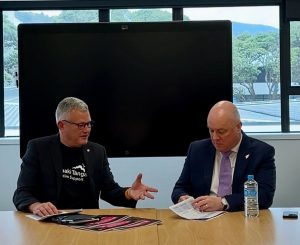
James McCulloch with the Prime Minister of New Zealand Christopher Luxon
Greta Hirschberg: How do you think victim support organisations should work with other members of the political and justice sector, and also stakeholders like police?
James McCulloch, VSNZ: As closely as possible! Victim support organisations are an integral part of the criminal justice system: we help people navigate that system, and stay engaged with it. It’s so important that victim support services are clearly understood by police, politicians and wider stakeholders. Here in NZ, we put a lot of time into that, including welcoming politicians on regular front line visits and being ultra clear about the social and economic impact we deliver. We made sure that our Prime Minister was personally briefed on that too.
Greta Hirschberg: You were nominated for the New Zealand Community Leadership Award- what do you think makes a great leader?
James McCulloch, VSNZ: That was very kind of my team. In simple terms, I think a great leader sets a clear direction, assembles great people to make that happen, ensures they have what they need to deliver it (including a great culture and environment) and gives them the space and freedom to do awesome things. Great leaders are also constantly looking ahead, staying visible (internally and externally) and also thinking about what could go wrong. It’s a lot to think about…so focusing on your own wellbeing and that of your team is also essential too.
When I arrived here at Manaaki Tāngata | Victim Support, I took time to travel the country and meet all our front-line teams to ask them what they felt needed to be improved here. That’s a big part of a leader’s role: find out what’s needed, and find the team and resources to make sure it happens!
Greta Hirschberg: Why do you think having a sense of “community” inside an organisation is so important? How can this feeling be cultivated?
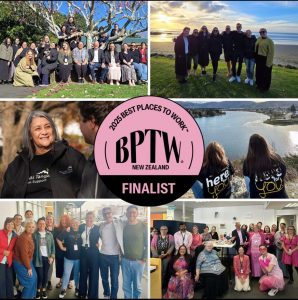
Manaaki Tāngata | Victim Support was a finalist of the Best Place to Work award, New Zealand
James McCulloch, VSNZ: I believe true wellbeing at work comes from strong purpose but also from being surrounded by great people. Your colleagues and your leaders can really make or break this experience and, as we each spend around 10,000 (!) days at work, it needs to be a good experience!
The work we all do in the victim support sector is tough, challenging and emotionally confronting. So, focusing on wellbeing, community and a ‘one team’ spirit is important. We have worked hard on that here, so that our front line feels better supported and better connected. Putting extra effort into our internal communications and injecting a sense of fun (wherever we can) has been a big part of that too.
Greta Hirschberg, VSE: You are leading Manaaki Tāngata | Victim Support through a series of changes and innovations, what are these and how did they come to be?
James McCulloch, VSNZ: We have changed and modernised a lot in recent years, and we needed to. As is so common in our sector, we’d drifted a bit with our mission and had started to become ‘all things to all people’. This wasn’t helping our front line, as they were becoming overwhelmed- and it wasn’t enabling us to make clear decisions about our priorities and impact.
So, we refreshed and vastly simplified our Core Purpose, and then updated and modernised pretty much everything else: our practice, our case management, our communication, and our whole approach to people and wellbeing.
It’s been a lot of work, and we have much more to do but I am very proud of the fact that we are a finalist in the 2025 NZ Best Places to Work awards, and have grown our team, our reach and our reputation huge amounts in recent years too. A total team effort!
Greta Hirschberg, VSE: And what is the next big goal for your organisation?
James McCulloch, VSNZ: We have a big goal in mind- to ensure to that ALL victims of crime in New Zealand can easily access our services if they wish to. This will mean changing our current police referral systems, significantly scaling up our capacity and technology, and widening our approach on communication and awareness raising. And, as the majority of crime in NZ is unreported, we are very mindful of reaching those that may need additional reassurance before engaging with an agency like ours. It’s a big ambition, but we are absolutely determined!
Greta Hirschberg, VSE: You are speaking at the Victim Support Europe final campaign event on the 28th of November. Why do you think attending this event is important, and what do you think European support services can learn from Manaaki Tāngata | Victim Support?
James McCulloch, VSNZ: We recognise how important it is for us to be connected to the wider victim support community, and to contribute too. Getting to events in person (where possible), and connecting regularly online is important- even if it can mean long travel or challenging time zones between NZ and Europe for calls!
I am looking forward to sharing the transformation journey we have been on here in NZ, but also to learning from so many other countries and leaders who have faced bigger challenges (and more victim numbers) than us.
There are some incredible innovations happening in victim support teams in Europe and I am also looking forward to spending time in separate meetings with Victim Support England/Wales and Slachtofferhulp Nederland too.
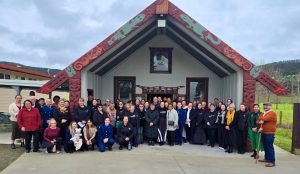
James McCulloch and some of the Manaaki Tāngata | Victim Support team

